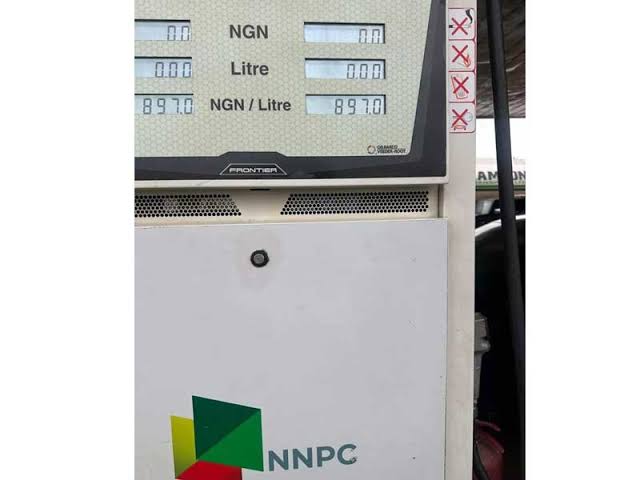…Why we can’t buy from Dangote – marketers
…
The Nigerian National Petroleum Company Limited (NNPC) Tuesday raised the pump price of petrol to N897 per litre from the official price of N617, with filling stations selling for N950 per litre.
The hike in the price of petrol comes as hopes by Nigerians for cheaper petrol from Dangote Refinery may have been dimmed by the revelation by the refinery’s owner and Africa’s biggest industrialist, Alhaji Aliko Dangote, that only the Nigeria National Petroleum Company Limited (NNPCL) would sell his petrol.
Experts in the downstream sector of the petroleum sector told The Authority that Dangote’s decision to sell exclusively to NNPCL was due to the realization that high prices and other import restrictions may have made independent marketers uncomfortable with buying from the refinery.
They argue that only NEPAL has the capacity to buy at exorbitant prices from Dangote and be able to “under recover” or subsidize the product before selling to marketers.
“Petrol from Dangote Refinery is definitely going to cost more than the ones imported from other parts of the world. I’m sure they know that none of us is going to patronize the refinery, reason they’re selling exclusively to NNPCL,” a major marketer told The Authority.
However, addressing a press conference Tuesday in Lagos, Dangote promised that his petrol would hit the streets in “48 hours”, but was quick to add that the deal would depend on how fast he concludes talks with NNPCL.
“Our PMS (Premium Motor Spirit) can be in filling stations within the next 48 hours depending on NNPCL,” said Dangote. He, however refused to comment on how much his petrol would cost, pushing the matter back to the Nigerian government.
“It is an arrangement which is designed and approved by the Federal Executive Council led by His Excellency, President Bola Ahmed.
Tinubu. As soon as it is finalised, which he (Tinubu) is pushing, once we finish with NNPC, it can be today, it can be tomorrow, we are ready to roll into the market.”
Also speaking to Reuters, Devakumar Edwin, a vice president at Dangote Industries Limited, said the refinery was testing the product (petrol) and would begin selling as soon as they are done with the testing.
Edwin reiterated Dangote’s position that only NNPC Ltd, Nigeria’s sole importer of gasoline, would buy its gasoline exclusively.
“If no one is buying it, we will export it as we have been exporting our aviation jet fuel and diesel,” assured Edwin.
Some major marketers who spoke to The Authority said they were amused that some Nigerians expected Dangote petrol to be cheaper.
“To begin with, they seem to forget that Dangote is a businessman, not the Red Cross. His primary motive for building the refinery is, of course, to make profit, not to make Nigerians happy. Even politicians elected to satisfy the needs of Nigerians have not done that, let
alone a private businessman,” noted one marketer.
He continued, “Nigerians seem to forget that Dangote borrowed and us still borrowing billions of US dollars, which he has to repay. When President Tinubu ordered NNPCL to alllow Dangote pay for crude in Nigeria, many rejoiced, forgetting that being on Lekki Free Trade Zone, Dangote Refinery, legally speaking, is not on Nigerian soil.
“They don’t seem to understand that, under the Free Trade Zone Act, buying petrol from Dangote won’t be different from buying from Australia. This is because to buy from Dangote, we, as marketers, have to fulfill all the conditions required for importation, including Form M and bill of lading, ” he added.
“The same persons opposing cattle ranching on the ground that it is personal business, are falling over themselves to pressure the Nigerian government into supporting Dangote refinery as if it is a public company owned by Nigerians.
“Recall that Dangote thanked President Tinubu for ordering NNPCL to sell crude to his refinery in Naira. The bug question is, why is Dangote exporting finished products, and earning forex? Since Nigerians put him first, why isn’t he reciprocating the gesture by selling to local marketers? Why is he waiting for the federal government to help him fix his price?” This isn’t how to show patriotism to a country that gas done so much for you,” declared the marketer.
Dangote also added that the introduction of naira for crude will reduce the demand for foreign exchange by 40 per cent.
“I want to thank President Bola Tinubu for creating this idea of Naira for crude and Naira for the product. Doing that will give a lot of stability to the Naira and remove 40 per cent of the demand for dollars. That’s not just it, there is a lot of round tripping,” he stated.
He added that it would become possible to track loaded trucks,
Nigeria Export Processing Zones Act LFN 2004
Form “M”. Bill of lading.
Section 8 of the Act, “approved enterprises operating within a Zone shall be exempted from all Federal, Government and State taxes, rates and levies”.
Marketers must fill Form M
Has he, aside Nigeria, secured a market for his product He needs to get countries buy in?
Free Trade Zones or Free Zones in Nigeria are also called Export Processing Zones (EPZs). These free zones (FZs) are different from other economic zones within the country. You can import, manufacture, and re-export goods in these zones without facing any tariffs and customs regulations.
Lekki free trade zone
Form M is a mandatory statutory document to be completed by all importers for importation of goods into Nigeria.
The life span of a Form M is 180 days (for general merchandise) and 365 days (for plant and machinery), after which an extension of 180 days (for general merchandise) and 365 days (for plant and machinery) can be granted on the Form M by the Authorized Dealer. Any further extension has to be approved by the Central Bank of Nigeria (CBN).
It is therefore mandatory for all importers to complete and register Form ‘M’ with Authorized Dealers at the time of placing orders whether the transaction is valid for foreign exchange or not. This is currently initiated electronically on Trade Portal provided by the Central Bank of Nigeria in conjunction with the Nigeria Customs Service.



